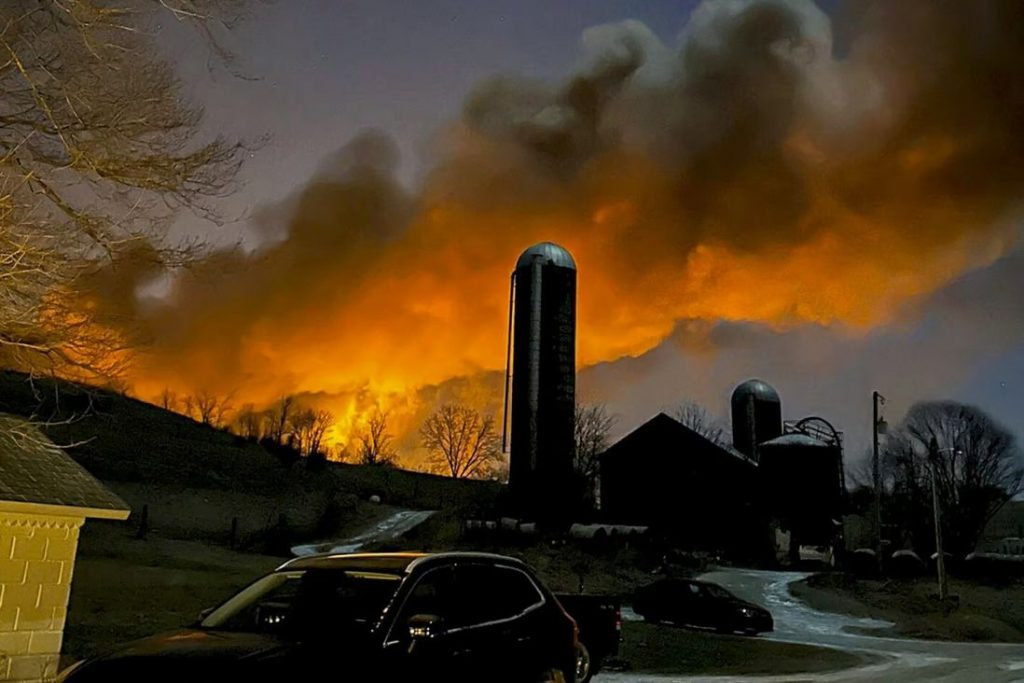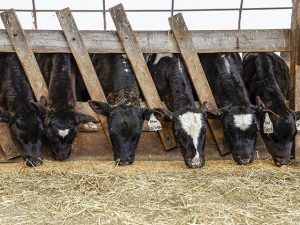
Concerns about Ohio’s toxic chemical spill and fire after a train derailment have spread to one of the US agricultural state’s biggest customers – China.
Interest in the burning chemicals – including vinyl chloride, butyl acrylate and ethyl hexyl acrylate – released into the atmosphere after a train derailment in the Midwestern state, started percolating on Chinese social media about 10 days after the incident.
Scientists shared their worries about the effects on soybeans, as well as milk and other consumer products imported from Ohio, while other experts have warned the incident could lead to uncertainty in China-US trade.
Ohio officials said 3,500 fish were killed in the 12km (7.5 miles) affected area. Some news outlets are reporting that animals are falling sick and dying near the site.
Of greatest concern is that three days after the train derailed and caught fire on February 3, the Norfolk Southern railway company treated the spill with a controlled burn.
The incineration “pushed the problem to a point of no return”, according to Sun Yafei, a member of China’s Science Communication Bureau and a PhD chemist with Tsinghua University.
“The oxygen in the air is not enough to support full combustion of hydrogen chloride, also it is difficult to reach the high temperature required for full combustion in the open air,” Sun wrote on his Weibo social media account.
“Anoxic combustion below 800 degrees Celsius [1,742 Fahrenheit] will produce dioxins, a group of unusually stable pollutants,” he added.
Sun said the dioxins would persist in the environment, pointing to the 1999 Nato air strike on then Yugoslavia which damaged many chemical plants, setting hundreds of tonnes of vinyl chloride alight in a fire which burned for days.
A 2002 survey by the Serbian government found significant excess dioxins in the soil around the affected area in the industrial city of Pancevo.
“Besides, incomplete combustion of vinyl chloride produces phosgene. Phosgene is highly toxic and was once used in World War I as a choking agent, which may be related to the death of surrounding birds and pets,” Sun said.
“Large amounts of hydrogen chloride will occur in the combustion. Hydrogen chloride is highly soluble in water and might make water acidic, which could poison nearby fish.”
An environmental scientist with the University of Chinese Academy of Sciences – who asked not to be named because of the issue’s political sensitivity – confirmed the pollutant’s hazards to the South China Morning Post on Thursday.
“Dioxins produced by combustion will pollute agricultural products through soil and water and eventually accumulate in the human body through the food chain. Scientific research shows the negative impact can even extend to the next generation,” he said.
“During the Vietnam war, dioxins were used in Agent Orange, a chemical herbicide and defoliant, by the US military. We have witnessed it had a long-term impact on the health of the Vietnamese people.”
The scientist said there was currently no specific solution to deal with dioxin pollution “but China has national standards for the content of dioxins in agricultural products”.
Shen Yi, a professor with Fudan University, said the incident raised concerns about China’s reliance on Ohio’s agricultural products.
“Although China has tried its best to diversify import allocation, China still purchases a considerable proportion of soybeans from the US and Ohio is one of the main states that exports soybeans to China,” Shen told Shanghai-based news website Guancha.
“Potential dioxin pollution brings more uncertainty to Sino-US trade relationships, and China needs to find a smart way to deal with this uncertainty.”
Zhu Danpeng, vice-president of the Guangdong Food Safety Guarantee Association, said he expected Chinese shoppers to be wary of imported produce from Ohio because of the concerns.
“Milk and beans produced in Ohio are bound to face resistance from consumers for a long time,” Zhu said, in a report published by China Economic View.
With China’s General Administration of Customs yet to respond to the Ohio incident, it is unclear whether restrictions will be imposed on relevant imports.
The customs agency’s regulations mean it can initiate an assessment of overseas food safety hazards and has the power to impose quarantine and recalls of imported foods of concern.
























